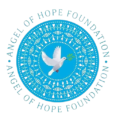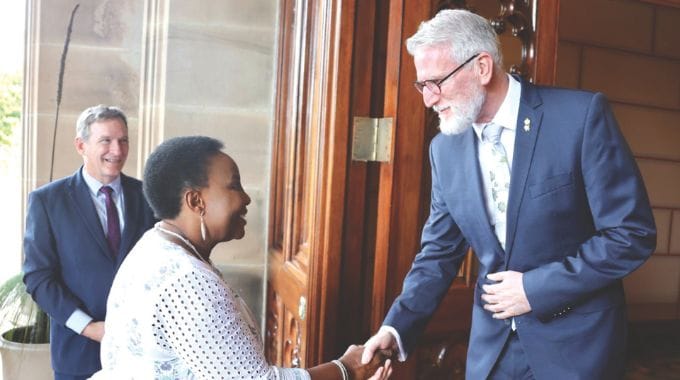New South Wales Governor commends First Lady’s works
Tendai Rupapa
Charity work, health issues, love and the quest to uplift the less-privileged reigned supreme when First Lady Dr Auxillia Mnangagwa met Her Excellency, Governor of New South Wales, the Honourable Margaret Beazley AC KC in Sydney.
Member for Blacktown Parliamentary Secretary for Planning and Public Spaces Mr Stephen Bali, who was among the people who welcomed Dr Mnangagwa when she toured Blacktown Hospital, was mesmerized by her charity work.
The Honourable Governor gave the First Lady a warm reception. After their discussions, she described Dr Mnangagwa as an example for other people who are involved in charity and volunteer activities.
During their discussions, Dr Mnangagwa expressed her deep appreciation for the warm reception she received from the people of New South Wales.
The First Lady visited Australia in her capacity as a philanthropist and she told the Governor that she was happy to have connected with various philanthropists in New South Wales who made substantial donations of goods including medical equipment to Zimbabwe.
The First Lady shared her philanthropic work, particularly in the areas of women’s and men’s health.
She informed the Governor that she was appointed the Ambassador for Health because of her dedication to improving public health outcomes in Zimbabwe.
The mother of the nation informed her host that her main focus on health was on both women’s and men’s health, adding that her health initiatives were aimed at addressing critical health challenges, raising awareness, and providing support to underserved populations.
The First Lady also pointed out that her programmes were focused on providing access to healthcare services to vulnerable communities, raising awareness about gender-specific health issues, and advocating for preventative measures.
She has also been actively involved in the campaign against gender-based violence and promoting mental health awareness among men and women, the Governor heard.
Amai Mnangagwa underscored that all of the services provided by the Angel of Hope Foundation (AoHF) were accessible to all Zimbabweans regardless of their political affiliations.
The Honourable Beazley commended the First Lady for using her position to bring positive transformation to the health system in Zimbabwe.
She also applauded Amai Mnangagwa for all of the initiatives that the Angel of Hope is spearheading in Zimbabwe saying she should be proud of herself.
Dr Mnangagwa said her work is driven by the compassion that she has for the less privileged and vulnerable people in Zimbabwe. Her Excellency, the Honourable Beazley, stated that the programmes being implemented by the First Lady were an indication that homegrown programmes can be successful in their own right.
She also highlighted that some of the social and health programmes being implemented by the First Lady were similar to programmes that are also being offered in Australia, particularly in Indigenous communities.
She added that there were programmes being implemented in regional towns that focus on providing medical facilities to vulnerable communities.
She further stated that most of these programmes are offered through mobile clinics.
The Governor indicated that the programmes have a holistic approach to health and that they cover treatment and also teach the importance of good nutrition and how to grow crops.
Dr Mnangagwa advised the Governor that she too ran a similar programme in Zimbabwe under her foundation called the “From Garden to Table” initiative which aims at addressing food security, improving nutrition, and promoting sustainable farming practices in Zimbabwe.
She highlighted that this initiative encourages families, particularly women, to grow their food in small-scale gardens, which can provide a reliable source of fresh healthy produce.
The programme, Hon Beazly was told, is also aimed to empower communities, reduce food insecurity, and promote healthy eating habits.
The discussions were also centred on the cooperation that exists between Australia and Zimbabwe in the education sector where Dr Mnangagwa highlighted that some Zimbabwean students were in Australia for studies, with some of them being beneficiaries of scholarships under the Australia Scholarship Awards Programme for Africa.
The First Lady said after finishing their studies the students are expected to return to their country and help build it.
She stated that education is a priority in Zimbabwe, adding that primary and high school education is compulsory.
On diseases, it came to light during the discussion that leading causes of death are cancers mostly breast, cervical and prostate, with HIV/AIDS still prevalent and some cancers being associated with the virus.
In light of this, Amai Mnangagwa has been pushing for greater awareness and early detection as crucial steps towards improving health outcomes.
During her awareness campaigns, the First Lady discovered that men are more reluctant to have their health checked, therefore, she is pushing for widespread education to help men understand the importance of early detection and the role it plays in not only protecting their own health but that of their families also.
The AoHF patron emphasized that early detection of cancer through regular screenings and self-examinations can greatly improve the chances of successful treatment and survival.
Honourable Beazley informed Dr Mnangagwa that Australia also had strong cancer awareness initiatives that advocate for early detection.
She pointed out that one of the most successful campaigns on cancer in Australia has been spearheaded by the McGrath Foundation, a prominent Australian charity dedicated to supporting individuals affected by breast cancer.
The Governor further informed the First Lady of a medical centre in Australia that used to offer free mammograms to women for early breast cancer detection. Amai Mnangagwa expressed gratitude to Honourable Beazley for the opportunity to come and meet her, extending an invitation to her to visit Zimbabwe so that she can have a first-hand appreciation of the country and what AoHF was doing in supporting and empowering vulnerable groups. – Herald

